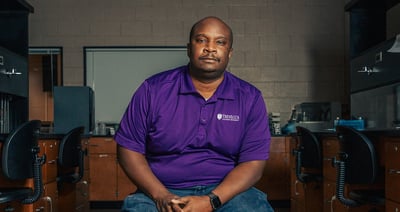Five Questions with Dr. Nyk Reed
| Faculty

A member of Trevecca’s faculty since 2013, Dr. Nyk Reed holds a bachelor’s in biology from Florida Agricultural and Mechanical University, where he was first introduced to genetics and developmental biology. He earned his doctorate at Meharry Medical College in 2010, completing his dissertation under the guidance of Douglas Mortlock in Vanderbilt’s Center for Human Genetics. Later, while working as a postdoctoral fellow in Thomas Aune’s lab at Vanderbilt University, Reed began teaching life science at Trevecca.
Recently, we asked Reed a few questions about his background, what he loves best about his work and why he’s excited about the new addition to the Greathouse Science Building currently under construction.
You’re a professor in our biology program. What’s your area of expertise or study? Why does it interest you?My doctorate is in genetics with an emphasis on regulators of development. I’m really interested in the changes within the DNA sequence that alter physical characteristics. I have always liked puzzles and logic problems. To me, the regulation of a gene and its role is just a puzzle to solve.
Research is a big part of the undergraduate experience at Trevecca. What kinds of research projects have you been able to do with students?
My research has fallen into two categories. Those are either goat projects or marine projects. We have done paternity testing on the Trevecca Urban Farm’s fainting goats to determine which of the babies carried the fainting allele. My Ph.D. work focused on Danio rerio, the zebrafish. For this reason, many of my of projects lean toward aquatic life. We have isolated DNA from local creeks to identify populations of the Nashville crawfish—I’m from Louisiana where we say crawfish not crayfish. We have looked at genomic differences between ornamental varieties of bubble tip anemones commonly for sale in the aquarium trade.
Trevecca is starting construction of an addition to the Greathouse Science building which will give more space and facilities to health sciences-related programs. Why do you think this will be an asset to the University?
The added labs and classroom space will be great. I am excited about the potential move of the exercise science program into the new addition. There is a lot of overlap in the courses taken by biology, exercise science, and nursing students. It will be good that all programs will be under the same roof because we already work together on many things.
Why are you passionate about working with students?
Instructors play a vital role in exposing students to the world around them. I feel that students should be exposed to as many different disciplines and schools of thought as possible. You can’t find your passion for something unless you are exposed to it. I tell students that it’s not my job to “make” them be a biologist. It’s my job to help them find what they can be great at. It may be a biologist, family counselor or it may be a pastor. I just want to help them find their passion.
In the days before COVID, you often were a part of a faculty/staff intramural team. Why was it important to you to be involved in that way?
Trevecca is a community. I like interacting with colleagues and students outside of the science building. Under normal circumstances, this would largely occur in the cafeteria, at plays, sporting events, and music recitals. Intramurals allow faculty to get to know students outside of the classroom and have fun with friendly competition. The competition and banter between faculty and students is great while playing softball and dodgeball is fantastic. The feeling of dread when you realize you’re about to get dunked on while playing intramural basketball isn’t as fantastic.
Want to know more?
From cancer research to toxicology and education to engineering, Trevecca can prepare you for your future in science and mathematics-related fields. In the Department of Science, Engineering and Mathematics, you’ll gain valuable classroom and research experience that will prepare you for your calling, whether that’s teaching, research, innovation, or something in the medical field.

